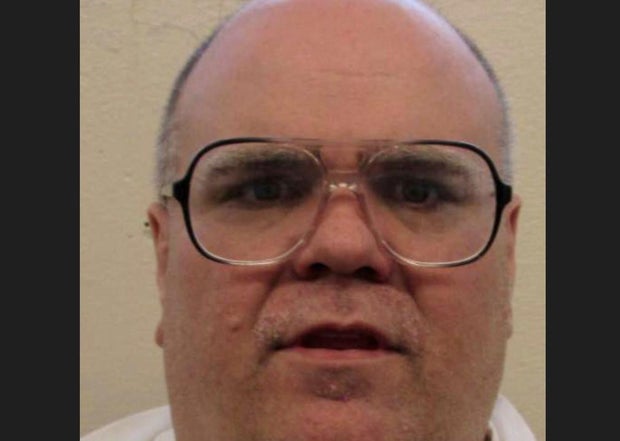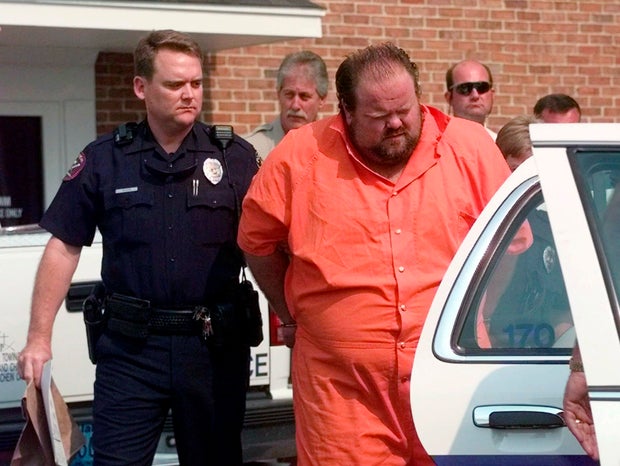Alabama Department of Corrections via AP
Atmore, Ala. — Alabama officials called off the Thursday lethal injection of a man convicted in a 1999 workplace shooting because of time concerns and trouble accessing the inmate’s veins.
Alabama Corrections Commissioner John Hamm said prison officials called off the execution after they determined inmate Alan Miller’s “veins could not be accessed in accordance with our protocol” before a midnight deadline to get the execution underway.
Miller has been returned to his cell at the south Alabama prison, Hamm said.
The execution’s halt came three hours after a divided US Supreme Court cleared the way for the execution to begin.
The 5-4 decision lifted an injunction granted after Miller’s attorneys said the state lost his paperwork requesting his execution be carried out using nitrogen hypoxia, a method legally available to him but that’s never used before in the US
Miller testified that he’d turned in the paperwork four years ago, putting it in a slot in his cell door at the Holman Correctional Facility for a prison worker to collect.
Miller described how he disliked needles because of painful attempts at drawing blood. He said the nitrogen method reminded him of the nitrous oxide gas used at dentist offices, and that seemed better than lethal injection.
“I did not want to be stabbed with a needle,” Miller said.
Alabama prison officials say they have no record of Miller returning the form, and argued that Miller was just trying to delay his execution.
On Tuesday, US District Judge R. Austin Huffaker Jr. issued a preliminary injunction blocking the state from killing Miller by any means other than nitrogen hypoxia, after finding it was “substantially likely” that Miller “submitted a timely election form even though the State says that it does not have any physical record of a form.”
Thursday night’s Supreme Court ruling vacated that injunction at the request of the state.
Dave Martin / AP
Although Alabama has authorized nitrogen hypoxia as an execution method, it hasn’t ever done so and the prison system hasn’t finalized procedures for using it to carry out a death sentence.
Miller had visits from family members and an attorney on Thursday as he waited to see if his execution would go forward. He was given a food tray that included meatloaf, chuckwagon steak, macaroni and french fries, the prison system said.
Nitrogen hypoxia is a proposed execution method in which death would be caused by forcing the inmate to breathe only nitrogen, thereby depriving him or her of the oxygen needed to maintain bodily functions. It is authorized as an execution method in three states but no state has attempted to put an inmate to death that way.
When Alabama approved nitrogen hypoxia as an execution method in 2018, state law gave inmates a brief window to designate it as their execution method.
“That the state is not yet prepared to execute anyone by nitrogen hypoxia does not mean it will harm the state or the public to honor Miller’s timely election of nitrogen hypoxia. By contrast, if an injunction does not issue, Miller will be irrevocably deprived of his choice in how he will die – a choice the Alabama Legislature bestowed upon him,” Huffaker wrote.
Miller, 57, was convicted of killing three people in a 1999 workplace rampage, drawing the death sentence.
Prosecutors said Miller, a delivery truck driver, killed co-workers Lee Holdbrooks and Scott Yancy at a business in suburban Birmingham and then drove off to shoot former supervisor Terry Jarvis at a business where Miller had previously worked. Each man was shot multiple times and Miller was captured after a highway chase.
Trial testimony indicated Miller believed the men were spreading rumors about him, including that he was gay. A psychiatrist hired by the defense found that Miller suffered from severe mental illness but also said Miller’s condition wasn’t bad enough to use as a basis for an insanity defense under state law.
www.cbsnews.com
George is Digismak’s reported cum editor with 13 years of experience in Journalism

